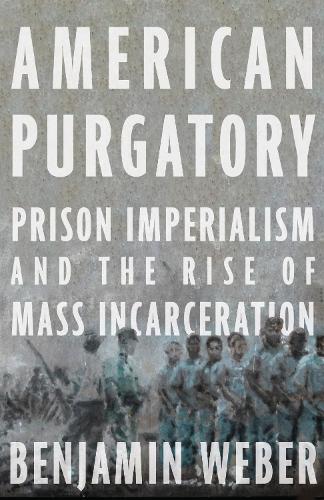
American Purgatory: Prison Imperialism and the Rise of Mass Incarceration
(Hardback)
Publishing Details
American Purgatory: Prison Imperialism and the Rise of Mass Incarceration
By (Author) Benjamin D. Weber
Illustrated by Ayo Y. Scott
Maps by Compass Cartographic
The New Press
The New Press
10th January 2024
United Kingdom
Classifications
General
Non Fiction
Slavery and abolition of slavery
History of the Americas
Military history
Colonialism and imperialism
365
Physical Properties
Hardback
352
Width 139mm, Height 215mm, Spine 22mm
Description
A groundbreaking look at how America exported mass incarceration around the globe, from a rising young historian
How the Word Is Passed: A Reckoning with the History of Slavery Across America
In this explosive new book, historian Benjamin D. Weber reveals how the story of American prisons is inextricably linked to the expansion of American power around the globe.
A vivid work of hidden history that spans the wars to subjugate Native Americans in the mid-nineteenth century, the conquest of the Western territories, and the creation of an American empire in Panama, Puerto Rico, and the Philippines, American Purgatory reveals how prison imperialismthe deliberate use of prisons to control restive, subject populationsis written into our national DNA, extending through to our modern era of mass incarceration. Weber also uncovers a surprisingly rich history of prison resistance, from the Seminole Chief Osceola to Assata Shakurone that invites us to rethink the scope of Americas long freedom struggle.
Webers brilliantly documented text is supplemented by original maps highlighting the global geography of prison imperialism, as well as illustrations of key figures in this history by the celebrated artist Ayo Scott. For readers of Michelle Alexanders The New Jim Crow, here is a bold new effort to tell the full story of prisons and incarcerationat home and abroadas well as a powerful future vision of a world without prisons.
Reviews
Praise for American Purgatory:
For years now, I have turned to Benjamin Webers work to more fully make sense of American history. He is a historian who has transformed my understanding of the relationship between racism, imperialism, and incarceration. He is a scholar who writes with both moral urgency and intellectual clarity. American Purgatory will forever change how we understand the rise of mass incarceration. It will forever change how we understand this country.
Clint Smith, bestselling author of How the Word Is Passed
American Purgatory is a tour de force that brings together the history of racial exploitation and colonialism over four centuries, as well as the various forms of opposition that consistently emerged in response to punitive developments. In doing so, Benjamin Weber provides a critical new framework that can help us envision a more equitable and just world.
Elizabeth Hinton, author of From the War on Poverty to the War on Crime
Masterfully researched and written, American Purgatory takes the history of mass incarceration to an entirely new level, as it connects centuries of American expansion and conquest on the North American continent and overseas to the planning logics and actual practices of prison systems. Benjamin Webers global perspective on prison imperialism as well as prisoners resistance has produced a field-defining book.
Evelyn Brooks Higginbotham, Harvard University
This outstanding book exposes the surprising connection between Americas current age of mass incarceration and the imperial prisons of the past. Showing how racism and colonialism shaped government efforts to incapacitate people who resisted the incursions of U.S. foreign policy, Weber highlights the urgency of understanding the relation between decolonization, antiracism, and the possibility of prison abolition.
Vincent Brown, author of Tackys Revolt
Author Bio
Benjamin D. Weber is an assistant professor of African American and African Studies at the University of California, Davis. He has worked at the Vera Institute of Justice, Alternate ROOTS, the Marcus Garvey and UNIA Papers Project, and as a public high school teacher in East Los Angeles. The author of American Purgatory (The New Press), he lives in Davis, California.
